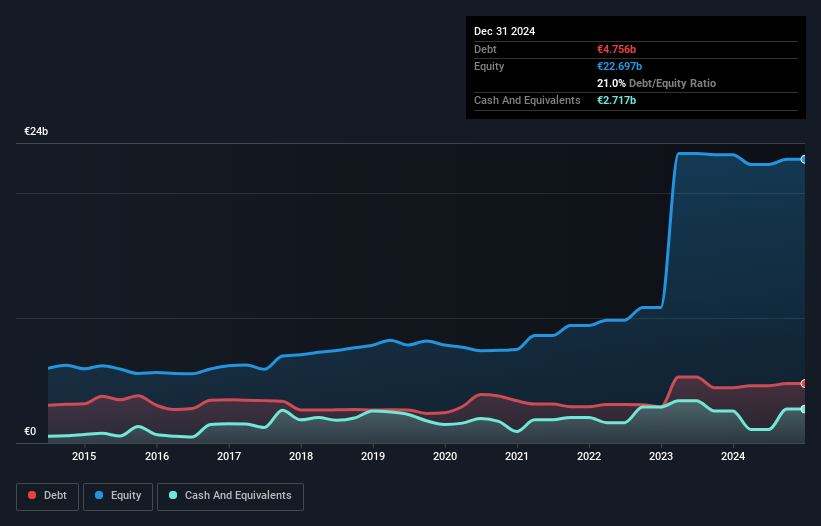Warren Buffett famously said, 'Volatility is far from synonymous with risk.' It's only natural to consider a company's balance sheet when you examine how risky it is, since debt is often involved when a business collapses. We note that DSM-Firmenich AG (AMS:DSFIR) does have debt on its balance sheet. But is this debt a concern to shareholders?
We've discovered 1 warning sign about DSM-Firmenich. View them for free.When Is Debt A Problem?
Generally speaking, debt only becomes a real problem when a company can't easily pay it off, either by raising capital or with its own cash flow. Part and parcel of capitalism is the process of 'creative destruction' where failed businesses are mercilessly liquidated by their bankers. While that is not too common, we often do see indebted companies permanently diluting shareholders because lenders force them to raise capital at a distressed price. Having said that, the most common situation is where a company manages its debt reasonably well - and to its own advantage. The first step when considering a company's debt levels is to consider its cash and debt together.
What Is DSM-Firmenich's Debt?
The image below, which you can click on for greater detail, shows that at December 2024 DSM-Firmenich had debt of €4.76b, up from €4.42b in one year. However, it does have €2.72b in cash offsetting this, leading to net debt of about €2.04b.

How Healthy Is DSM-Firmenich's Balance Sheet?
Zooming in on the latest balance sheet data, we can see that DSM-Firmenich had liabilities of €4.36b due within 12 months and liabilities of €6.69b due beyond that. Offsetting these obligations, it had cash of €2.72b as well as receivables valued at €2.76b due within 12 months. So its liabilities total €5.58b more than the combination of its cash and short-term receivables.
This deficit isn't so bad because DSM-Firmenich is worth a massive €24.6b, and thus could probably raise enough capital to shore up its balance sheet, if the need arose. But we definitely want to keep our eyes open to indications that its debt is bringing too much risk.
Check out our latest analysis for DSM-Firmenich
We measure a company's debt load relative to its earnings power by looking at its net debt divided by its earnings before interest, tax, depreciation, and amortization (EBITDA) and by calculating how easily its earnings before interest and tax (EBIT) cover its interest expense (interest cover). The advantage of this approach is that we take into account both the absolute quantum of debt (with net debt to EBITDA) and the actual interest expenses associated with that debt (with its interest cover ratio).
While DSM-Firmenich's low debt to EBITDA ratio of 1.3 suggests only modest use of debt, the fact that EBIT only covered the interest expense by 5.5 times last year does give us pause. But the interest payments are certainly sufficient to have us thinking about how affordable its debt is. We also note that DSM-Firmenich improved its EBIT from a last year's loss to a positive €509m. There's no doubt that we learn most about debt from the balance sheet. But ultimately the future profitability of the business will decide if DSM-Firmenich can strengthen its balance sheet over time. So if you're focused on the future you can check out this free report showing analyst profit forecasts.
Finally, while the tax-man may adore accounting profits, lenders only accept cold hard cash. So it's worth checking how much of the earnings before interest and tax (EBIT) is backed by free cash flow. Happily for any shareholders, DSM-Firmenich actually produced more free cash flow than EBIT over the last year. That sort of strong cash conversion gets us as excited as the crowd when the beat drops at a Daft Punk concert.
Our View
Happily, DSM-Firmenich's impressive conversion of EBIT to free cash flow implies it has the upper hand on its debt. And we also thought its net debt to EBITDA was a positive. All these things considered, it appears that DSM-Firmenich can comfortably handle its current debt levels. On the plus side, this leverage can boost shareholder returns, but the potential downside is more risk of loss, so it's worth monitoring the balance sheet. The balance sheet is clearly the area to focus on when you are analysing debt. But ultimately, every company can contain risks that exist outside of the balance sheet. We've identified 1 warning sign with DSM-Firmenich , and understanding them should be part of your investment process.
If you're interested in investing in businesses that can grow profits without the burden of debt, then check out this free list of growing businesses that have net cash on the balance sheet.
New: Manage All Your Stock Portfolios in One Place
We've created the ultimate portfolio companion for stock investors, and it's free.
• Connect an unlimited number of Portfolios and see your total in one currency
• Be alerted to new Warning Signs or Risks via email or mobile
• Track the Fair Value of your stocks
Have feedback on this article? Concerned about the content? Get in touch with us directly. Alternatively, email editorial-team (at) simplywallst.com.
This article by Simply Wall St is general in nature. We provide commentary based on historical data and analyst forecasts only using an unbiased methodology and our articles are not intended to be financial advice. It does not constitute a recommendation to buy or sell any stock, and does not take account of your objectives, or your financial situation. We aim to bring you long-term focused analysis driven by fundamental data. Note that our analysis may not factor in the latest price-sensitive company announcements or qualitative material. Simply Wall St has no position in any stocks mentioned.
About ENXTAM:DSFIR
DSM-Firmenich
Provides nutrition, health, and beauty solutions in Switzerland, the Netherlands, rest of Europe, the Middle East and Africa, North America, Latin America, China, and rest of Asia.
Flawless balance sheet and good value.
Similar Companies
Market Insights
Community Narratives




